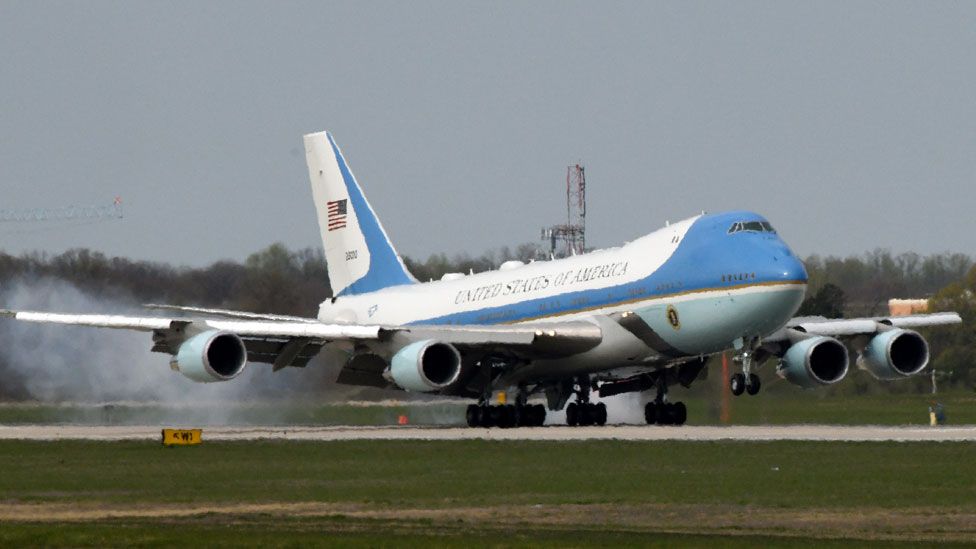Air Force Once and other White House typos
- Published

The White House has blamed a "clerical error" for a typo in a news release stating that Iran "has" an ongoing nuclear weapons programme.
It should actually have read "had" - in the past tense - administration officials say.
That's a big difference.
It's no secret that President Donald Trump himself frequently hits "send" on his tweets before editing them for spelling errors.
But ever since winning the election, his White House has been plagued with typos and misspelled words - including on official documents and press releases referring to sensitive diplomatic matters such as US national security.
As long as there is human error, every organisation is prone to an embarrassing gaffe in its written communications. But the Trump presidency seems particularly prone to orthographical mishaps.
Here are some notable examples, with input from the BBC's White House reporter.
The important ones
In response to a speech by the Israeli prime minister that claimed Iran had lied about its nuclear ambitions before a 2015 international pact, the White House released a statement that suggested the alleged programme was still active.
Iran "has a robust, clandestine nuclear weapons program", the statement said.
That would have contradicted assessments by US intelligence agencies, the International Atomic Energy Agency and the UK, France and Germany, which found that Tehran suspended its nuclear activities as part of the agreement three years ago.
The White House later changed the press release's wording online to say that Iran "had" - not "has" - a nuclear programme.
Allow Twitter content?
This article contains content provided by Twitter. We ask for your permission before anything is loaded, as they may be using cookies and other technologies. You may want to read Twitter’s cookie policy, external and privacy policy, external before accepting. To view this content choose ‘accept and continue’.
The White House said the mistake was down to a "clerical error" but some observers, like former Obama adviser Ned Price, thought it was a deliberate attempt to twist the facts.
Allow Twitter content?
This article contains content provided by Twitter. We ask for your permission before anything is loaded, as they may be using cookies and other technologies. You may want to read Twitter’s cookie policy, external and privacy policy, external before accepting. To view this content choose ‘accept and continue’.
The diplomatically embarrassing ones
Less than a month after taking office, the White House misspelled the name of British Prime Minister Theresa May three times in a press release announcing her visit.
Her first name was spelled repeatedly with no "h" which, the Independent noted, is the name of a pornographic actress who starred in films including "Whitehouse: The Sex Video" and "Leather Lust".
Mr Trump later made a similar mistake in a tweet, when he tagged a Sussex woman (whose Twitter account had only six followers) with a similar name to the politician.
In May 2017, as Mr Trump prepared to travel to Israel, the White House released a list of his goals, including to "promote the possibility of lasting peach" in the Middle East.
President Donald Trump on the invented country of 'Nambia'
The trivial ones
Even as Mr Trump prepared to be sworn into office in January 2017, his inauguration posters declared that "no challenge is to great".
Before his first official State of the Union speech, invitations went out calling it the "state of the uniom", but many noted that Congress was actually responsible for that error.
In a White House list of global terror attacks, the nation of Denmark was misspelled as "Denmakr" along with the word "attaker" to describe the assailants.
In at least two official schedules, the president's plane is referred to as "Air Force Once".
Mr Trump himself frequently makes spelling errors on Twitter before deleting them and replacing them with corrected tweets.
Some transparency advocates have criticised him for this, arguing that he is essentially destroying official government communiques.
Does it matter?
Analysis by Tara McKelvey, BBC White House reporter
The West Wing is run by a skeleton staff (the president doesn't like "strangers", says one senior official), and I often see officials working late at their desks.
They're overextended, and partly as a result they make mistakes. Some seem trivial - the wrong version of a document being posted online, or the misspelling of a foreign dignitary's name.
Others are comical, like the ongoing goal to achieve "lasting peach".
Unfortunately, though, the typos are emblematic of a larger issue. Unlike their predecessors in the West Wing, many of the Trump administration officials have backgrounds that are unconventional for these roles.
In many cases, they have little experience in the nitty-gritty of policymaking and are not steeped in the details of the issues they're writing about, whether the Middle East, US-UK relations or steel tariffs.
As a result, the documents they release, summarising their policies, often contain schoolboy errors.
- Published31 May 2017
- Published21 March 2017
- Published31 May 2017